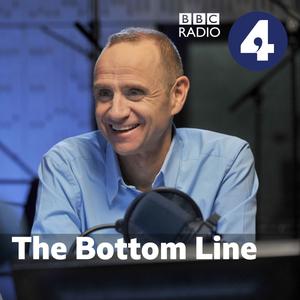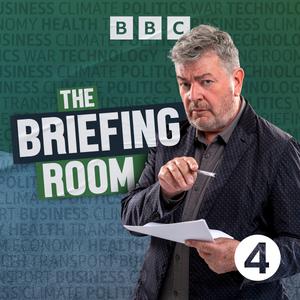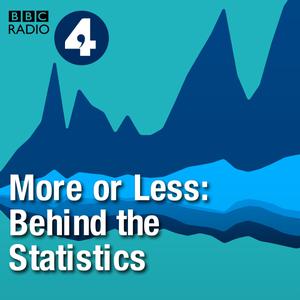
The Bottom Line
BBC
Evan Davis hosts the business conversation show with people at the top giving insight into what matters
- 34 minutes 31 secondsRobots On the Doorstep: Is This The Future Of Food Delivery?
Evan Davis talks to the Estonian Ahti Heinla, co-founder of robot delivery firm Starship Technologies, which is hoping to expand across the UK. Evan hears about Ahti's early life in Estonia, how he competed in a Nasa competition, the start of the delivery system in Milton Keynes and how he thinks robot deliveries will grow in the future in Britain and worldwide.
30 January 2025, 12:03 pm - 35 minutes 11 secondsUnbossing: Can We Work Without Managers?
Can businesses operate without managers? It's an idea Amazon, Meta and Citigroup are exploring. Evan hears from the leaders of three companies who've already tried working that way, but with varying degrees of success.
Guests: Chris May: Founder of Mayden Hazel Brown: CEO of Cornerstone Luke Kyte: Operations Director of Reddico
Presenter: Evan Davis Producers: Nick Holland and Bob Howard Sound: James Beard Production Coordinator: Katie Morrison Editor: Matt Willis
23 January 2025, 12:04 pm - 46 minutes 37 secondsA Four Day Week: Less Work for More People?
Evan Davis explores if working the traditional five day week could be replaced by working four, eight hour days. Could working more efficiently benefit employees and bosses? With Joe Ryle, director of the 4 Day Week Campaign, Claire Daniels, CEO of Trio Media and Jen Thompson, managing director of the Crate Brewery.
16 January 2025, 12:04 pm - 13 minutes 49 secondsDecisions That Made Me: Sir John Hegarty (The Garage Soho, Founder)
The advertising exec behind some of the most successful adverts of recent decades shares some of the decisions that have influenced his career, including an early decision to accept a lower salary and instead pursue and opportunity that would bring him more opportunities. Sir John would go out to co-found successful agencies Bartle Bogle Hegarty, and Saatchi and Saatchi.
Today, Sir John says he shuns five year plans, instead focusing on 'five minute plans' and says he tries to make each day as interesting as it can be.
Production team: Producer: Drew Hyndman Editor: Matt Willis Sound: Rod Farquhar Production co-ordinator: Katie Morrison
12 January 2025, 11:30 pm - 34 minutes 6 secondsNetworking: Will It Actually Help Me Get a Job?
Evan Davis gets up-to-date tips on finding a new job and hears how the process of making yourself stand out to an employer has changed over the years.
Episode guests: Sophie O'Brien: CEO and Founder of Pollen Careers Depesh Nathwani: CEO of The Consumer Helpline Group Shan Saba: Director of Brightwork Staffline
Presenter: Evan Davis Producers: Bob Howard and Nick Holland Production Co-ordinator: Katie Morrison Sound: Rod Farquhar Editor: Matt Willis
The Bottom Line is produced in partnership with The Open University.
9 January 2025, 12:04 pm - 14 minutes 3 secondsDecisions That Made Me: Dana Denis-Smith (Obelisk Support, CEO)
Career clarity can be hard to find in the middle of a demanding 9 to 5, but sometimes getting away from it all for a while can make you realise what you really want from work. For Dana Denis-Smith, the world's highest mountain range did the trick. She tells Evan Davis how it inspired her to turn her back on an unfulfilling legal career, and later to start up her own company, Obelisk Support, which champions the talents of mothers who don't want to - or can't - return to work full time.
Production team: Producers: Simon Tulett and Drew Hyndman Editor: Matt Willis Sound: Rod Farquhar Production co-ordinator: Katie Morrison
6 January 2025, 11:45 am - 14 minutes 40 secondsDecisions That Made Me: Jordan Brompton (Myenergi, Co-founder)
When your background differs from the people working with and around you, it’s easy to feel judged by the assumptions people make about you from class to gender. Whatever your upbringing, it’s something we all deal with - our backgrounds are always with us, either to be embraced, accepted, or fled from. Jordan Brompton, entrepreneur and co-founder of the smart energy tech company Myenergi, shares her experience as a working class woman and her love of solar panels.
Production team: Producers: Simon Tulett and Michaela Graichen Researcher: Drew Hyndman Editor: Matt Willis Sound: Rod Farquhar Production co-ordinator: Katie Morrison
18 December 2024, 9:45 am - 14 minutes 47 secondsDecisions That Made Me: Julian Douglas (VCCP, Global CEO)
When do you start that side hustle you've always talked about doing? What if it gets you fired from work? And even if you do leave, make your success and build your hustle into a successful business, can you ever decide to step away and go back to your career? Julian Douglas, global CEO of advertising agency VCCP, talks to Evan Davis about his decision to go in to advertising, being fired for his night life start up, and then walking away from the company he founded to go back to his former career.
Production team: Producers: Simon Tulett and Michaela Graichen Researcher: Drew Hyndman Editor: Matt Willis Sound: Rod Farquhar Production co-ordinator: Katie Morrison
17 December 2024, 5:32 pm - 14 minutes 46 secondsDecisions That Made Me: Rob Law (Trunki Suitcases, Inventor)
When your business is about making products, and the factory you use gets into trouble, that’s potentially a big problem. Do you try to find another one, or do you try to fix it? Rob Law, entrepreneur and inventor of the Trunki children’s suitcase, had exactly this dilemma, and tells Evan Davis about the risky decision it prompted.
He also discusses the illness and personal loss that have shaped his career, and recalls his infamous appearance on Dragon’s Den almost 20 years ago.
Production team: Producers: Simon Tulett and Michaela Graichen Researcher: Drew Hyndman Editor: Matt Willis Sound: Rod Farquhar Production co-ordinator: Katie Morrison
17 December 2024, 4:35 pm - 16 minutes 30 secondsDecisions That Made Me: Tom Pellereau (Stylideas, Inventor)
When inventor Tom Pellereau was on the verge of launching his latest invention for his fashion company, Stylideas, he couldn't have known what a key decision was about to face him. The Apprentice winner talks to Evan Davis about his business relationship with Alan Sugar, his passion for design and his experience of dyslexia that all led to a stand off over pricing that would make or break his company.
Production team: Producers: Simon Tulett and Michaela Graichen Researcher: Drew Hyndman Editor: Matt Willis Sound: Rod Farquhar Production co-ordinator: Katie Morrison
12 December 2024, 12:30 pm - 13 minutes 48 secondsDecisions That Made Me: Elmarie Marais (GoCrisis, Founder)
What do you do when you’re unhappy at work? Maybe you’re burnt out from long hours? Or you see the way your employer does things and think to yourself “surely there’s a better way?” For many founders and CEO's, it's a familiar experience, and one that can spur them into the decision of starting their own business. Evan Davis talks to Elmarie Marais about her experience of crisis management, and how a crisis of her own led to the founding of her own company, GoCrisis.
Production team: Producers: Simon Tulett and Drew Hyndman Editor: Matt Willis Sound: Rod Farquhar Production co-ordinator: Katie Morrison
5 December 2024, 12:30 pm - More Episodes? Get the App
Your feedback is valuable to us. Should you encounter any bugs, glitches, lack of functionality or other problems, please email us on [email protected] or join Moon.FM Telegram Group where you can talk directly to the dev team who are happy to answer any queries.
 The Briefing Room
The Briefing Room
 Political Thinking with Nick Robinson
Political Thinking with Nick Robinson
 Money Box
Money Box
 Analysis
Analysis
 More or Less: Behind the Stats
More or Less: Behind the Stats
 Moral Maze
Moral Maze